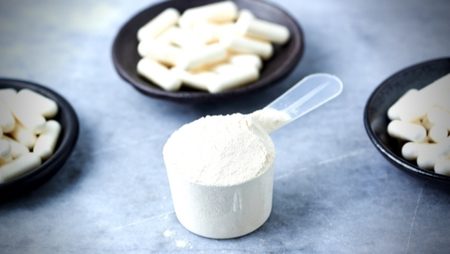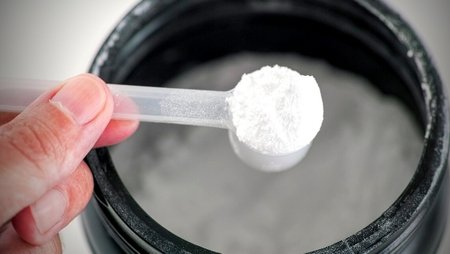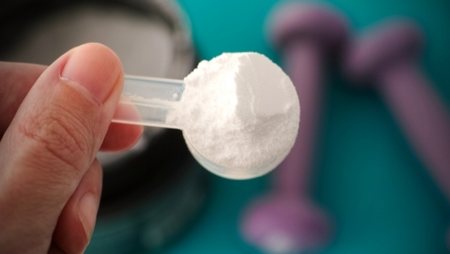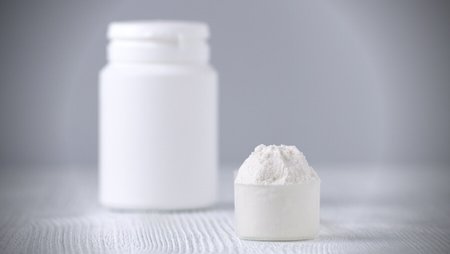
The dream of living off a single “pill” or “tablet” for nutrition is slowly inching closer to reality. As the nutritional supplement industry expands, we are better equipped than ever to optimize our health. Crucial nutrients and amino acids are now within easy reach, unlike the struggles our ancestors faced.
Consider the mitochondria-boosting amino acid, creatine. Before, you would need to consume approximately 5kg of meat to get an amount equivalent to a 5-6 gram scoop of creatine supplement. Such developments empower us to strategize our health in light of our unique genetic makeup, environment, and diets.
Take Glutamine, an amino acid crucial for those with high-stress levels caused by gut issues, immunity challenges, or exercise-induced muscle damage. It plays a key role in nitrogen balance and recovery processes. This article explores the benefits of consuming Glutamine for overall health, immunity, gut health, and mood.
Overview:
- Glutamine can precurse to the synthesis of a Master Anxiodiant called: “Glutathione “(glutamate–cysteine–glycine), which boosts Nucleus Accumbens and dopamine function for motivation and prevents toxicity from Heavy Metals such as Mercury, Aluminium, and Arsenic. Furthermore helps regulate GABA and GLUTAMATE Dysfunction.
- Glutamine involves the gut-lining repair process, provides a source of good bacteria, as well as reduces the inflammatory response caused by inflammation.
- Glutamine is essential because it alters our Cortisol level, protects us from Muscle Breakdown(Catabolism), keeps immunity healthy, and spares effect on those T-cells.
Balancing cortisol is one of the most important aspects of longevity. Why? Dysregulated excess cortisol can counteract the secretion of the sleep hormone “Melatonin,” a hormone almost involves all of Longevity, Aging, Mitochondrial Health, and more.
Suggestion: Does Melatonin Counteract Caffeine?
Why We Need Glutamine?

Protein in our body that build blocks everything in the organism, including the immune system, as well as helps to repair and build tissues. Glutamine is the most abundant amino acid in the body; besides, our body is almost made of cells by proteins as well as almost involves most of the repairing processes people need for optimal functions as well as nitrogen balances.
Plus, Glutamine can boost mood by boost gut health by supporting the gut microbiome and promoting GABA levels.
Why Is Glutamine Good For Mood?

I like L-Glutamine because it elevates mood by boosting gut health by supporting a friendly microbiome.
Most people are becoming more aware of the mood affection of the Gut. The scientific community now calls the Gut the “Second Brain” The second brain can connect through vagus nerves, which carries information and neurotransmitter which alter the brain chemicals(and mood) such as GABA, Serotonin, And Dopamine.
That’s why anything related to the Gut or Lack of Friendly bacteria (For example, Lactobacillus Rhamnosus deficiency) leads to impaired GABA synthesis and can cause anxiety.
- GABA: My opinion is not Serotonin, but GABA is the main chemical responsible for “Anxiety” and “Overthinking.”
- Inflammation: Brain chemicals and neurotransmitters synthesis is negatively impacted by inflammation, which might be the reason for Anxiety and depression.
Thanks for L-Glutamine because it is beneficial for the cell repair process in the Gut as well as the expression of tight junction proteins and the integrity of the intestinal lining,
Glutamine affects gut cytokine production. In the laboratory, Glutamine regulates immune cell cytokine production and protects the Gut from experimental enterocolitis.
Glutamine reduces pro-inflammatory cytokine production by human intestinal mucosa, probably by a post-transcriptional pathway. Glutamine could be useful to modulate inflammatory conditions with imbalanced cytokine production.
Neurotransmitters And Glutamine

neurotransmitter, which modulates human nerve signals
body.
Most of us know that Glutamine is mainly used for this issues such as:
- Immune System
- Acid-Base Balance
- Transport Of Ammonia
- Gluconeogenesis
Regardless, L-Glutamine also involves the expression synthesis of neurotransmitters such as Glutamate and γ-aminobutyric acid (GABA). (These brain chemicals can regulate our mood and sleep quality)
GABA and glutamate-glutamine dysregulation are increasingly linked to the development of mood and anxiety disorders.
The reason why GABA and Glutamate Dysregulations happen is because of inflammation as well as Glutathione deficiency.
The surprise happens that Glutathione is made of there amino acids, and L-Glutamine is one of them. (Others Cysteine and Glycine)
Glutathione can protect the brain cells from toxin Heavy Metals overloads, such as Arsenic, Mercury, Cadmium, and Excess Iron, as well as inhibit mitochondrial damage. (that mitochondrial dysregulation is also linked to Anxiety because of the low level of energy storage feeding the “Hippocampus” brain area.)
We can see that Glutamine deficiency can impair the synthesis of Glutathione and eventually cause GABA and Glutamate Dysregulations.
How Does This Process Work?
- When we take Glutamine or Glutamate, there is an enzyme called “glutamate decarboxylase,” which converts Glutamate to GABA.
- This process requires the active form of Vitamin B6 (Pyridoxal-5-Phosphate (P5P) to work.
- Taurine, on the other hand, helps to boost the enzymes and works better, as well as other minerals such as Magnesium and Zinc help to regulate GABA receptors.
Related: Relaxing and Focusing: GABA and Glutamate in the Human Brain
Glutamine Reduces Cortisol
Another benefit is that Glutamine can reduce the catabolic stress hormone called “cortisol.”Research shows that a slight decrease in cortisol was observed with glutamine supplementation.
For that, Glutamine can help to manage stress as well as the spare effect on Muscle breakdown.
Why Are The Effection On The High Cortisol Level Our Overall Health?
Here you can check on why making an optimal level of cortisol is crucial for health.
| Symptoms | Influential Factors of Cortisol |
|---|---|
| Insomnia | The delicate balance of cortisol can be disrupted by high levels, leading to an alteration of normal sleep patterns and the onset of insomnia. Additionally, a prolonged state of insomnia can exacerbate cortisol levels. |
| Fatigue | Elevated cortisol levels can induce a chronic state of “fight or flight,” resulting in feelings of fatigue. |
| Depression | Elevated cortisol levels can be a contributing factor to the onset of depression and anxiety. |
| Weight gain | Prolonged elevation of cortisol can lead to weight gain, particularly around the abdominal region. |
| Decreased immune function | High cortisol levels can weaken the immune system, making it more challenging for the body to fend off infections. |
Better Recovery After Workout
This is why top-performing athletes use L-Glutamine for muscle recovery and nitrogen balance.
It does not just increase nitrogen activity and support blood flows in the muscle also, Glutamine triggers anabolic hormones as well as sparing effects into muscle breakdown while in low-protein environments.
It’s crucial because when we experience immunity problems such as Flu and influenza, our immune cells, specifically white blood cells, crave proteins. Right?
If there is not enough protein available at that moment, now our body starts to utilize muscle proteins to for promoting fuel our immune system. (As well as creating Glutathione)
For that, L-Glutamine is important for muscle and by supporting White Blood Cells for fuel in a low-protein environment.
Note: Glutamine components help to recover faster, although sleep is the foremost important aspect of recovery, and no other supplements are reached at that point.
Melatonin involves the process of growth hormone secretion, as well as Genetic activation for increasing Testosterone(that drives better recovery), and reducing cortisol. On the other hand, if you suffer delayed onset muscle, Melatonin is a strong hormone that plays recovery too.
Glutamine Trigger Anabolic Signals
Building muscle and an immune system requires mTOR anabolic signals for proper functions.
L-Glutamine, on the other hand, triggers mTORC1 signaling, which leads to Muscular Hypertrophy responses and growth.
We need to certain balance anabolic and catabolic pathways for optimum fat-burning as well as detoxification processes (Autophagy).
A certain amount of mTOR signaling protects muscle sarcopenia and helps the immune system, mainly in older people. (Elder people tend to have less mTOR pathway, that’s why they have low immunity and muscle breakdown).
High-Quality Amino Acids and Glutamine support that process. Yet, if you are in the middle ages, and you are constantly consuming High-Carb process foods all day, you might have excessive mTOR signaling, which leads to Cancer cells growth, as well as the aging process and impairs cells detoxification by suppressing Autophagy.
L-Glutamine Do Not Cause Cancer

The worry that L-Glutamine could foster cancer growth is a common misconception. This concern arises because cancer cells, like healthy cells, utilize Glutamine for fuel. However, the inflammation, notably gut inflammation, that often triggers Glutamine can mitigate cancer.
Another misbelief is that overactive mTOR activation, which could spur cancer cell growth, is caused by L-Glutamine. This is not the case.
People should not fear the intake of a low dosage of this amino acid. Consuming 10-15 grams of nearly calorie-free L-Glutamine will not feed cancer cells as one might fear. Rather, this dosage can support white blood cells and other immune cells in preventing cancer cell growth.
Instead of fearing a small L-Glutamine dosage, you should eliminate sugar, omega-6, and processed foods from your diet. These, not the 5-10 mg of Glutamine, pose a more significant threat to your health.
Scientists believe that oxidative stress is a cause of many diseases, including cancer, ADHD (attention deficit/hyperactivity disorder), autism, Parkinson’s, Alzheimer’s, chronic fatigue syndrome, as well as depression and anxiety. Glutathione is a strong antioxidant that serves as the mitochondria’s foremost defense mechanism against oxidative stress damage, but without enought L- Glutamine, your body doesn’t always produce enough Glutathione for sure.
Note: L-Glutamine while fasting, disturbs the Autophagy process via activating mTOR signaling and Insulin.
Time Restriction Eating, Or Intermittent Fasting
Ketones and a Fasting-mimicking diet are significant things that fight cancer cells while shrinking tumors combined with high-vitamin C and Curcumin.
“Autophagy” activation is detrimental to Cancer cells, stimulated by Intermittent Fasting, Time Restriction Eating, or certain supplements such as Curcumin and Berberine.
Time Restriction Eating or Dry Fasting is a better strategy for those who want to optimize mTOR and Autophagy balance. We are talking about “balance,” not “overactive “Autophagy,” which is detrimental to our immune system too.
Glutamine is a good and healthy alternative for triggering “mTOR” activation in the right way that supports white blood cells and inflammation as well as protects muscle from Catabolism. Isn’t it?
Related: Does Intermittent Fasting Increase Longevity?
Don’t Fear The Glutamine, Do Fast
Fasting is the best method when it comes to Autophagy, AMPK regulation as well as mitochondrial health.
Instead of fearing Glutamine, it would be a better idea to do it at least 1 or 2 times a week for 18 hours of intermittent fasting(depending on your current situation); that’s turn-on the Autophagy process as well as promote SIRTUIN genes and cell detoxifications and mitochondrial health.
If you are a beginner in intermittent fasting, I suggest reading a comprehensive and science-backed article I wrote for you.
Suggestions: Does Intermittent Fasting Increase Longevity?
Does Glutamine Improve Sleep Quality and Insomnia Symptoms?
Indeed, there is evidence to suggest that glutamine may aid in improving sleep quality and reducing insomnia symptoms by reducing inflammation in the gut as well as stimulating better digestion of nutrition.
| Glutamine Benefits | Does it work? |
|---|---|
| Better brain chemistry | Yes |
| Gut healing properties | Yes |
| Recovery | Yes |
| Reduce muscle pain | Yes |
| Cortisol Drop | Yes |
Glutamine notably aids in recovery and gut healing. With the “gut-brain axis” influencing our brain’s operation, Glutamine’s role is crucial in improving digestion and stimulating a more optimal conversion of serotonin (L-Tryptophan) to melatonin. Reducing inflammation in the gut, thanks to Glutamine, can also help balance overall brain chemistry, aiding in melatonin production.
Certain studies reveal that Glutamine can even reduce cortisol levels in individuals experiencing issues with it. This makes Glutamine’s role even more essential in maintaining a healthy body.
What Are the Best Sources of Glutamine, and Types of Supplements Are Available?
The best sources of glutamine are high-protein foods such as grass-fed beef, wild-caught fish(source of omega-3), organic chicken, and eggs, as well as fermented foods like yogurt, kefir(the best one also helps the microbiome), and sauerkraut.
However, there are also some supplements available on the market. You can check it here:
| Type of Glutamine Supplements | Comparison |
|---|---|
| L-glutamine powder | These are easy to take and convenient for people always on the go. |
| Glutamine capsules | A superior version of glutamine supplementation, this form is deemed superior in efficacy to the conventional L-glutamine powder, offering a more potent and effective nutritional boost. |
| Glutamine peptides | A cutting-edge supplement crafted from the fermentation of glutamine, this form of nutritional aid is believed to surpass the effectiveness of traditional L-glutamine powder, providing a more potent and efficacious nutritional boost. |
| Fermented glutamine | A cutting-edge supplement crafted from the fermentation of glutamine, this form of nutritional aid is believed to surpass the effectiveness of traditional L-glutamine powder, providing a more potent and efficacious dietary boost. |
| L-glutamine cream | A topical treatment of, this supplement is specifically designed to enhance the health and appearance of both skin and hair, providing a luxurious and rejuvenating experience. |
How Much Glutamine Should I Use For Best Results?
It depends on it, and you won’t need to use it daily.
If you are in a high-stress environment (overtraining), I suggest using at least 15 gr a day for a faster recovery process by enabling positive nitrogen balance.
Outline
Glutamine is essential for antioxidant protection by stimulating Glutathione synthesis, which leads to nucleus accumbens regulation that affects the neuro-adaptation of neurons in the brain reward area. (eventually mood)
Glutamine supports gut health by repairing the gut lining, helps turn off inflammation, and protects us from Anxiety and Depression. (Anxiety-inflammation connection)
I recommend that you use Glutamine supplements, particularly on high-intensity exercise days, because of better recovery, nitrogen balance, and Growth Hormone secretion. (Which is another hormone affecting our fitness, as well as a fat-burning process)
What is the relationship between Glutamine and Glutathione?
Glutamine is a vital amino acid for producing Glutathione, a potent antioxidant. When Glutamine is present in adequate quantities, it helps your body generate more Glutathione, enhancing its capacity to fight oxidative stress and inflammation.
How does Glutamine affect Glutamate levels in the body?
Glutamine is a precursor to Glutamate, a crucial neurotransmitter in the brain. When the brain needs Glutamate, it can convert Glutamine into Glutamate to fulfill this need. This process is vital for ensuring the proper functioning of your nervous system.
Can Glutamine boost muscle growth?
Glutamine can enhance muscle growth. It plays an important role in protein synthesis, essential for muscle growth. By taking Glutamine supplements, you might be able to increase your muscle size and strength more effectively.
Is Glutamine an anti-catabolic agent?
Yes, Glutamine is often referred to as an anti-catabolic agent. It helps to prevent the breakdown of muscle tissue, which can be especially beneficial during periods of stress or intense workouts. Consuming adequate Glutamine could help maintain your muscle mass and support recovery.